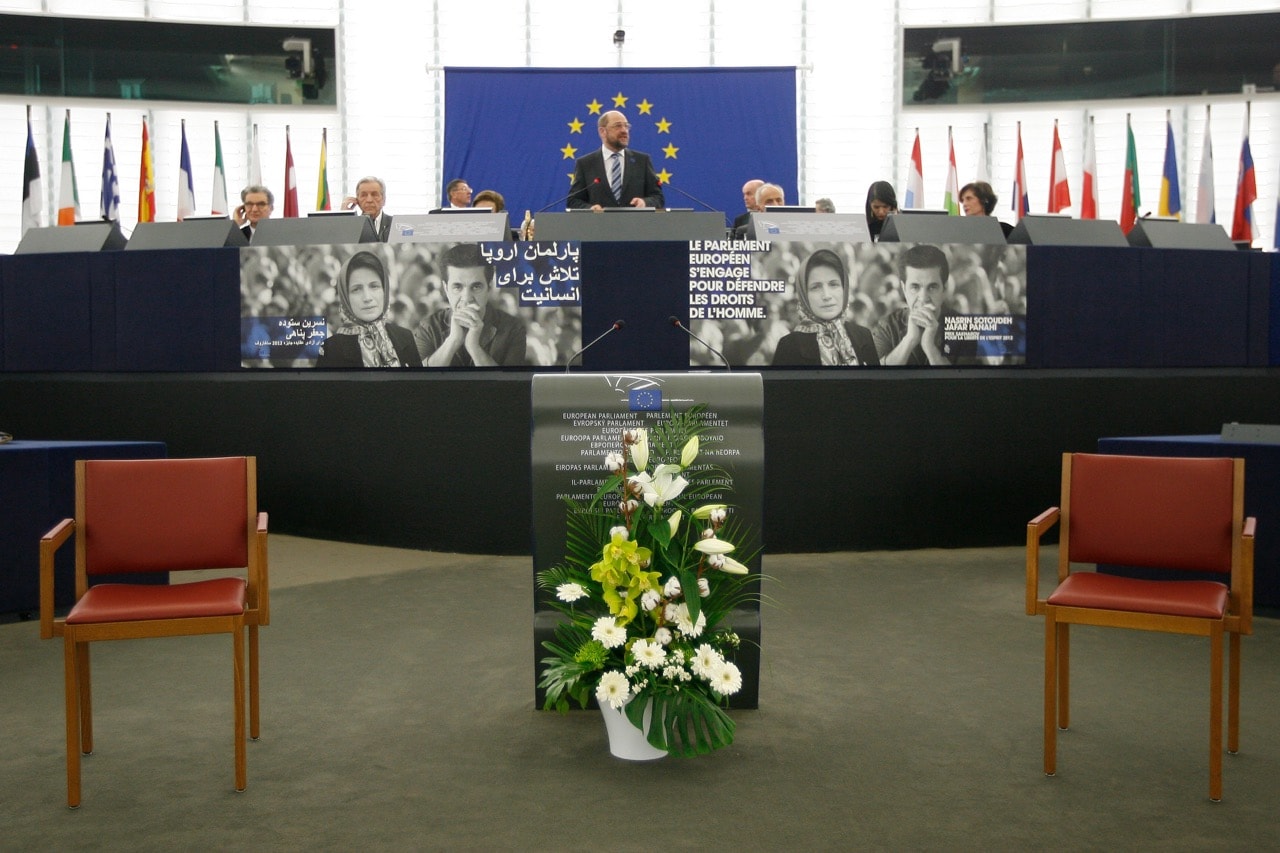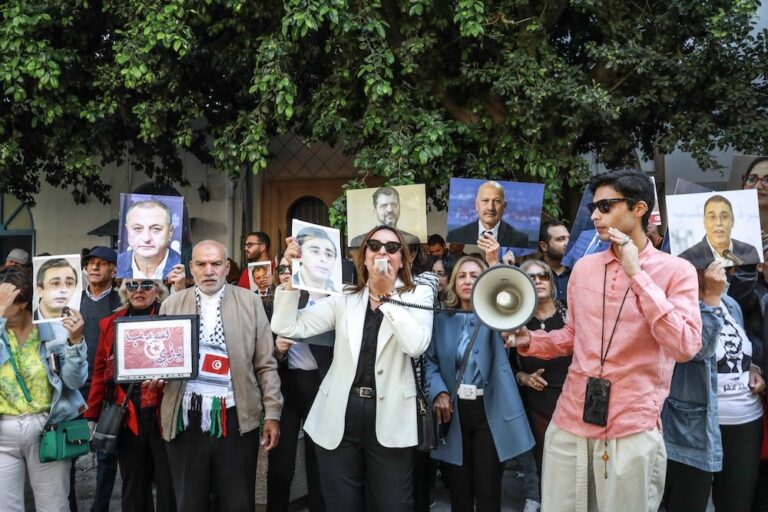Women human rights defenders across the MENA region face many obstacles to their work, including threats, harassment, torture, jail, travel bans and other violations that prevent them from freely carrying out their work. GCHR asks supporters to join the campaign in support of WHRDs worldwide by tweeting #SheDefends.
This statement was originally published on gc4hr.org on 29 November 2017.
On International Women Human Rights Defenders (WHRDs) Day, marked every year on 29 November, the Gulf Centre for Human Rights (GCHR) calls upon governments and armed groups in the MENA region to free all detained WHRDs. Women across the region face many obstacles to their work, including threats, harassment, torture, jail, travel bans and other violations that prevent them from carrying out their work freely. GCHR asks supporters to join the campaign in support of WHRDs worldwide by tweeting #SheDefends.
In Saudi Arabia, women have been legally harassed and detained for protesting the guardianship system and for exercising their right to drive – a right that was only granted this year, but won’t be implemented until June 2018. On 31 July 2017, Saudi woman human rights defender Mariam Al-Otaibi was released from prison after more than 100 days. She immediately said in a tweet, “You can accomplish what your mind has prepared you for and what you have been able to do, just do not let others think you think you cannot :) #Maryam_Free_Without a Guardian.”
GCHR welcomed this news with great enthusiasm, however unfortunately the precedent of arrest is stronger than the precedent of freedom when it comes to issues related to women in Saudi Arabia. It has been proven in several studies such as the UN Special Rapporteur on Extreme Poverty and Human Rights’ recent report, that the only way Saudi Arabia’s economy will be stabilised is if Saudi women are given their basic rights to not only drive but also work, and have the freedom to choose how their lives should fold out. If Saudi Arabia is serious about empowering women through Vision 2030, then it must allow WHRDs to carry out their work without restrictions – not just by letting them drive, but by letting them carry out advocacy without fear of going to jail or being banned from travel. This can only happen with the abolishment of the guardianship system as well as the general improvement of a more rights-oriented system. Silencing women activists continues as many of them who campaigned to lift the driving ban were warned by the Royal Court against making comments in the media or on their social media accounts.
It’s not possible for human rights defenders to work freely in Saudi Arabia right now, with almost all of them in jail or ceasing work.
Most recently, on 10 November 2017, the Specialised Criminal Court (SCC) in Riyadh sentenced woman human rights defender and Internet activist Naima Al-Matrood to six years in jail followed by six years of a travel ban. Al-Matrood was arrested on 13 April 2016 at the Directorate of Public Investigation in Al-Dammam. She was charged with allegedly participating in a number of anti-state demonstrations and rallies, being linked to a media cell, and violating public order by creating two social networking accounts on Twitter and Facebook to demand the release of some detainees. Al-Matrood has actively contributed to the peaceful human rights movement in the Eastern Province. Her health is deteriorating because of anemia, which has caused her vision to weaken.
In Iran, many people who campaign for women’s rights have been jailed and the country treats WHRDs more harshly than others, jailing them for lengthy sentences despite illness and separating them from their families.
Atena Daemi, who has campaigned for women’s rights and against the death penalty, has been imprisoned since November 2016 after being convicted of charges that were based solely on her peaceful human rights activities. She was first arrested on 21 October 2014 and held for several months in Evin prison, including 51 days in solitary confinement, before being released on bail in February 2015. In May 2015, a Revolutionary Court in Tehran sentenced Daemi to 14 years in prison after an unfair trial lasting only 15 minutes. The court convicted her of charges including “gathering and colluding to commit crimes against national security”, “spreading propaganda against the system”, and “insulting the Supreme Leader”. Her sentence was later reduced to seven years on appeal. Daemi was re-arrested on 26 November 2016 by Revolutionary Guards officials who beat and pepper sprayed her, and punched her sister.
Also in Iran, Narges Mohammadi, former Vice-President of the Defenders of Human Rights Centre (DHRC) and President of the Executive Committee of the National Council of Peace in Iran, remains in prison. She was awarded the Andrei Sakharov Prize (2017) from the the American Physical Society. On 28 September 2016, Mohammadi’s sentence was upheld by the Tehran Court of Appeals. On 17 May, she received a 10-year sentence for “membership in the Step by Step to Stop the Death Penalty” (known by the acronym LEGAM). LEGAM is a group campaigning against the death penalty in Iran that Mohammadi founded and which has been closed since her arrest. In addition to her 10-year sentence, she received five years for alleged “collusion and assembly against national security” and one year for “spreading propaganda against the system.”
In June and July 2016, Mohammadi went on hunger strike to protest restrictions on her contact with her two children. “I am asking for nothing other than being allowed to talk to my children on the phone. If this demand is too great, irrational, immoral, unlawful, or against national security, please let me know,” said Mohammadi in an open letter published by the International Campaign for Human Rights in Iran.
Even after their release, WHRDs remain imprisoned in their country, unable to leave due to travel bans. Iranian human rights lawyer Nasrin Sotoudeh, co-winner of the 2012 Sakharov Prize for Freedom of Thought, continues to be banned from travelling. She was released in September 2013 after having spent over three years in prison. She was given a 20-year travel ban.
In Syria, Razan Zaitouneh and Samira Al-Khalil were kidnapped from the Violations Documentation Center (VDC) offices with two male colleagues by armed, masked gunmen in Douma on 9 December 2013 and have been held ever since. There has been no word of their health or circumstances since they were abducted almost four years ago.
Zaitouneh was one of the most prominent lawyers and WHRDs defending political prisoners in Syria since 2001. She has played a key role in efforts to defend human rights for all people and protect independent groups and Syrian activists. She was awarded the European Parliament’s 2011 Sakharov Prize for Freedom of Thought and the 2011 Anna Politkovskaya Award of Reach All Women in War (RAW in WAR).
On International Women Human Rights Defenders Day, GCHR reiterates its calls to free Naimaa Al-Matrood, Atena Daimi, Nargess Mohammadi, Razan Zaitouneh and Samira Al-Khalil and to end the trials and torture of WHRDs including Ebtisam Al-Saegh.
While many have been imprisoned, GCHR takes this opportunity to congratulate all the WHRDs across the Gulf and neighbouring countries for their important work bringing human rights issues into focus, including many whose work has been recognised with international awards. They include brave women from Yemen such as journalist and WHRD Afrah Nasser, winner of the Committee to Protect Journalists’ 2017 International Press Freedom Award; and Yemeni WHRD Radhya Al-Mutawakel, chosen as Human Rights and Freedom of Speech Defender for October 2017 by GCHR, Maharat Foundation and the Arabic Network for Human Rights Information.
Following up on GCHR’s 2016 report Before It’s Too Late: Tangible Protection Mechanisms for Women Human Rights Defenders in the MENA Region and Beyond, GCHR further reiterates recommendations for the UN to “build and cultivate a secure, protected environment for WHRDs and their work: focusing on the creation, the tangible implementation and ensuring sustainability of said preventative and protections mechanisms, specifically tailored for WHRDs.” There is an extensive list of recommendations for the UN, UN member states, civil society and donors.



